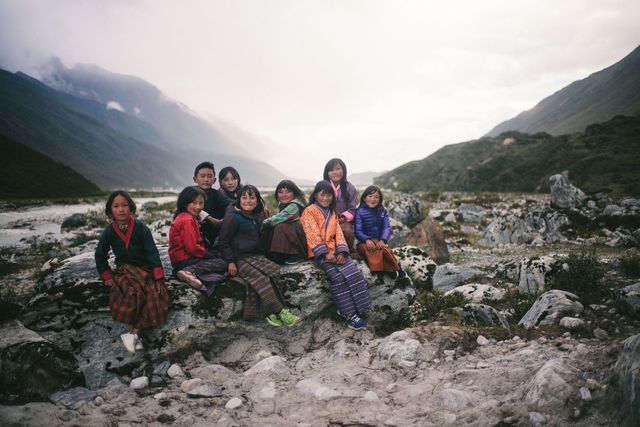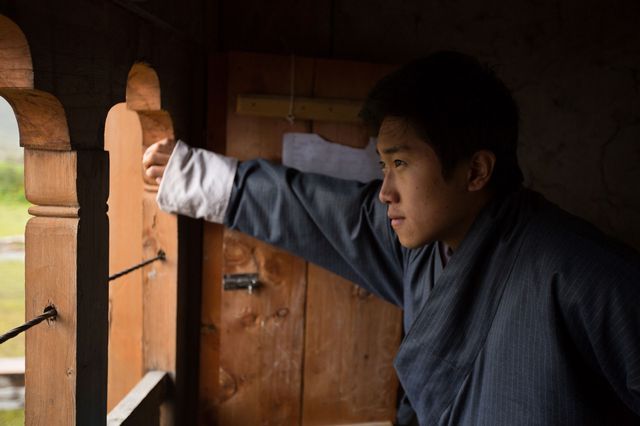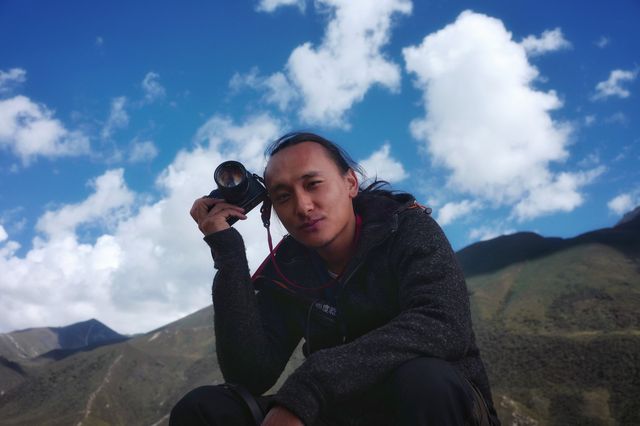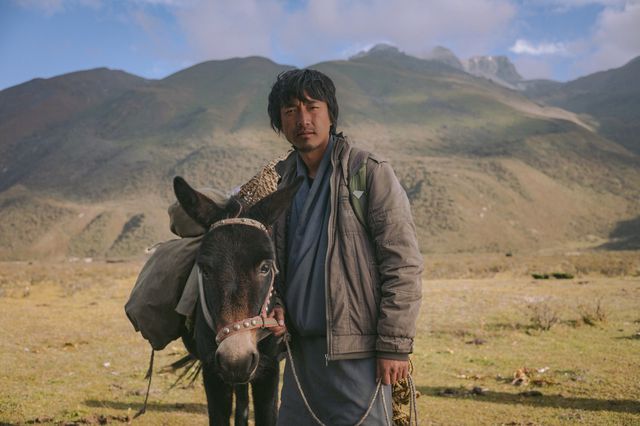From March 31st in Italian cinemas with Officine UBU Lunana: The village at the end of the world by Pawo Choyning Dorji, the first film made entirely in Bhutan to be nominated for the Academy Award for Best International Film. In a world where people seem to have lost their spirituality in search of material well-being, Bhutan is a model to draw inspiration from: this is where GDP is replaced by FIL, the Gross Domestic Happiness index. “Lunana: The Village at the End of the World” is set and made in the happiest country in the world, but what does it really mean to be happy? And is it possible to find happiness in a place you don’t expect? This is also asked by Ugyen, a young teacher, who would like to go in search of his happiness, but is forced to undertake an 8-day journey that will take him to the most remote school in the world, in the remote village of Lunana, located along the glaciers. of the Himalayas on the border between Bhutan and Tibet at 4,800 meters above sea level. There, in the company of placid yaks and deprived of all modern comforts, he will discover that the secret of happiness lies in the simplicity of the small gestures and smiles of the inhabitants of Lunana, a microcosm that is slowly fading. Shot in collaboration with the villagers, the film introduces us to a place suspended in time, miles away from big cities and protected by mountains, as if it were a small hidden treasure chest, containing the most precious of riches.
The official plot
The official plot: A young teacher from modern Bhutan, Ugyen, shirks his duties as he plans to go to Australia to become a singer. As a rebuke, his superiors send him to the most remote school in the world, in a village called Lunana, to complete his service. After an 8-day journey, Ugyen finds himself exiled from his westernized comforts. In Lunana there is no electricity, no textbooks and no blackboard. Though poor, the villagers extend a warm welcome to their new teacher, but he faces the daunting task of teaching the village children with no teaching tools available. Overwhelmed, he is about to decide to go home, but little by little he begins to know the difficulties in the life of the extraordinary children he teaches, so much so that he feels changed thanks to the extraordinary spiritual strength of the villagers.
The cast of Lunana

The villagers, many of whom had never seen the world outside of Lunana, were chosen to play many of the leading roles.
Sherab Dorji (Ugyen) he dropped out of school to pursue a career in music. She currently works for M-Studio, a record label based in Thimphu, Bhutan. Before starring in Lunana: The Village at the End of the World, Sherab, much like the character she plays in the film, was considering moving to Australia to pursue her musical dreams. Lunana: The Village at the End of the World is Sherab’s film debut.
Ugyen Norbu Lhendup (Michen) is currently an unemployed civil engineer with a passion for music and acting. He originally auditioned for the role of Ugyen. Writer and director Pawo Choyning Dorji was so impressed with his portrayal that he created the character of Michen especially for him. This is her screen debut.
Kelden Lhamo Gurung (Saldon) is a second year student of Royal Thimphu College. She is also part of the M-Studio and has produced numerous songs for the Bhutanese record label. Kelden took a year off from college to work on the film. Lunana: The Village at the End of the World is Kelden’s film debut.
Pem Zam (Pem Zam) she is 9 years old and is a student of Lunana Primary School. Just like the character she plays in the film, Pem Zam comes from a divided family and currently lives with her grandmother. Never having left her remote village of hers, she doesn’t know what electricity or the Internet is. She dreams of one day going beyond the mountains of Lunana and driving a car for the first time. Lunana: The Village at the End of the World is Pem Zam’s debut.
Lunana – trailers and videos
Official Italian trailer released on March 5, 2022
Three Italian TV spots published on March 16, 2022
First clip in Italian released on March 22, 2022
Second clip in Italian published on 25 March 2022
Third clip in Italian published on 30 March 2022
Fourth clip in Italian published on 1 April 2022
Curiosity

- Pawo Choyning Dorji is a writer, photographer and filmmaker from the Kingdom of Bhutan. Pawo’s introduction to film came in 2012 when he worked as Khyentse Norbu’s assistant on the film Vara: A Blessing. In 2016 he produced the critically acclaimed Bhutanese film Hema Hema: Sing me a song while I wait. The film had its world premiere at the 69th Festival del film Locarno and won the Special Mention at the Toronto International Film Festival 2016. Lunana: The Village at the End of the World is your directorial debut.
- The producer Stephanie Lai studied acting at the London Academy of Music and Dramatic Art. She has been an actress for the Taiwan-based theater group Performance Workshop for the past 15 years. She made her film debut when she was 10 for Edward Yang’s A Brighter Summer Day (1991). In addition to being a producer on the film, Stephanie was also the acting teacher to an entire cast of actors for the first time. Stephanie has been married to Pawo since 2009.
- The director of photography Jigme Tenzing is a cinematographer living in Bhutan. His career began in New York, where he worked on various productions. Over the past decade, Jigme has worked in Bhutan, Nepal, India and the United States, where he has shot several independent films and award-winning commercials.
- The dark valley: The film was shot in the most remote school in the world, in the village of Lunana. The village is a settlement found along the glaciers of the Himalayas, accessible only via an 8-day trek on some of the tallest mountains in the world. There are only 56 people in the village, most of whom had never seen the world outside of Lunana. The word “Lunana” literally means “the dark valley”; a valley so far away that the light does not even reach it. The village is so isolated that even today there is no electricity and no connections to the cellular network. Due to the lack of facilities, the production of the film was totally dependent on solar-powered batteries.
- All of Lunana’s actors are mountaineers, many of whom had never seen the outside world before. They had never seen a movie and they had never seen cameras before. It was also the first time they had used toothpaste.
- The director and crew loaded 65 mules with cameras, solar panels, batteries, lights and audio equipment for the eight-day trip over the mountains to secluded Lunana to shoot.
Director’s notes – Pursuit of happiness

As the nation of “gross domestic happiness”, Bhutan is arguably the happiest country in the world. But what does it really mean to be happy? Are the Bhutanese really that happy? Ironically, many Bhutanese leave Bhutan, the land of happiness, to seek their version of “happiness” in the modern and glittering cities of the west. With Lunana: The village at the end of the world, I wanted to tell a story in which Ugyen, the young protagonist, also wants to go in search of his happiness. However, he is forced to embark on another journey. He finds himself in a world that is different from the modern world in every respect. During this journey he realizes that what we so desperately seek in the material world has actually always existed within us, and that happiness is not really a destination but the journey. Although extremely challenging, I wanted to shoot the film in Lunana, inspired by the purity of the land and the people. I also wanted everyone involved in the production to experience this life-changing journey, so that the authenticity of the experience could translate into the film. The main themes of the story are the pursuit of happiness and the sense of belonging, and these are universal themes that everyone can relate to, regardless of their culture and background. I wanted to present these themes through a place like Lunana, a world and a people so different not only from the rest of the world, but also from Bhutan itself. I wanted to show that even though in such a distant world, the hopes and dreams that connect humanity are the same. [Pawo Choyning Dorji]

